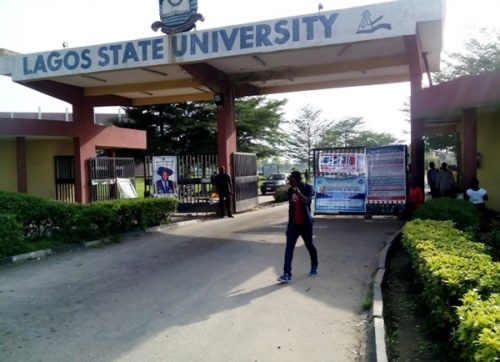
Chaos in LASU: Staff Unions Declare Indefinite Strike, Campus Grinds to a Halt

The atmosphere at Lagos State University (LASU) turned tense and uncertain today as staff unions collectively declared an indefinite strike action, throwing the institution into disarray and sparking a wave of concern among students, parents, and academic stakeholders. The announcement, made early Thursday morning, followed what the union leaders described as prolonged and unresolved issues with the university’s management, despite numerous attempts at dialogue.
The strike, which takes immediate effect, was jointly declared by the three major staff unions operating within the university: the Academic Staff Union of Universities (ASUU-LASU chapter), the Senior Staff Association of Nigerian Universities (SSANU), and the Non-Academic Staff Union (NASU). The unions stated that their patience had been stretched beyond its limits, and the strike action is their only remaining option to demand accountability and justice from the university's leadership.
Reports from the university’s main campus in Ojo revealed that several departments had already begun shutting down operations. Lecturers vacated classrooms, administrative offices were locked, and university buses sat idle, reflecting a paralysis that affected virtually every sector of the school. Many students, caught off guard, were seen leaving the campus with frustration and confusion, some expressing fear about how the disruption might affect their academic progress.
According to a joint statement signed by the leaders of the three unions, the major grievances fueling the industrial action include delays in the payment of earned allowances, issues of promotion arrears, non-implementation of the 2009 ASUU-FGN agreement, and the alleged victimization of union members who had earlier voiced opposition to management decisions. The unions also accused the school authorities of turning a deaf ear to repeated calls for improved working conditions and renegotiation of outdated policies that directly affect the welfare of academic and non-academic staff.
The statement read in part: “Our engagement with the university management has continually been met with insincerity, half-hearted promises, and outright neglect. For too long, we have tolerated this systemic disregard for staff welfare and the sanctity of agreements reached in previous meetings. Today, we draw a line. This indefinite strike is not just about money; it is about dignity, respect, and fairness in the workplace.”
The Vice-Chancellor of Lagos State University, Professor Ibiyemi Olatunji-Bello, responded to the strike declaration with a brief press statement urging calm among students and stakeholders. She acknowledged the demands made by the unions but appealed for more dialogue, emphasizing that the management was still open to negotiations. However, her statement did little to quell the growing unrest on campus, as the unions stood firm on their decision to down tools until all their demands are met.
Many students who had just resumed for the semester expressed disappointment over the latest disruption, with some final-year students especially anxious about how this would affect their graduation timelines. “We just resumed last month and now this? It’s really frustrating,” said Zainab Salisu, a 400-level Economics student. “We’ve not even completed our course outlines and they’re telling us again that school is on strike. How long will this continue?”
Parents and guardians have also begun voicing their concerns, with some calling on the state government to urgently intervene before the situation degenerates further. “We pay so much to keep our children in school only for them to stay idle at home because of administrative quarrels,” lamented Mr. Oluwaseun Ajayi, whose son is in his third year at LASU. “Something needs to be done before this academic year is completely derailed.”
Meanwhile, the Lagos State Government has yet to issue an official response to the strike as of press time. However, sources within the Ministry of Education disclosed that meetings may be scheduled in the coming days to engage both the university management and the union representatives in an attempt to resolve the impasse. This comes against the backdrop of Governor Babajide Sanwo-Olu’s previous commitment to transforming LASU into a world-class institution and ensuring industrial harmony within state-owned tertiary institutions.
The strike at LASU also adds to the broader national context of repeated industrial actions in Nigerian universities, many of which stem from similar grievances—underfunding, mismanagement, and failure to implement collective agreements. While LASU has, in recent years, prided itself on relatively fewer disruptions compared to federal universities, this latest development signals a growing dissatisfaction that mirrors national concerns about the future of higher education in Nigeria.
Critics argue that unless urgent reforms are introduced to address both the infrastructural and human resource deficits in universities, more of such strikes will continue to plague Nigeria’s education sector. They also warn that continuous academic interruptions not only demoralize students and staff but also compromise the quality and credibility of degrees awarded.
Back at the LASU main gate, the usual buzz of academic activity was replaced by unusual silence and uncertainty. A group of students gathered in front of the library expressed their frustration to reporters, unsure whether to return home or wait and see how the next few days unfold. Some were seen using their mobile phones to try and contact course advisors or departmental secretaries, only to be met with automated responses or no replies at all.
By midday, some union members had already begun picketing certain administrative buildings, holding placards with messages like “We deserve better,” “Enough is Enough,” and “Justice for LASU Staff.” Security presence on campus was minimal, although university marshals were observed monitoring the situation closely. No incidents of violence or confrontation had been reported as of the time this article was filed.
As the strike action gains momentum, all eyes now turn to the Lagos State Government and the university’s governing council to see how quickly they can navigate the storm and bring all stakeholders back to the negotiating table. Whether this will happen in days or drag on for weeks remains to be seen. One thing, however, is clear: LASU is now at a critical crossroads, and how this crisis is handled will either reinforce or dismantle the fragile trust that currently exists between staff and the school’s leadership.


